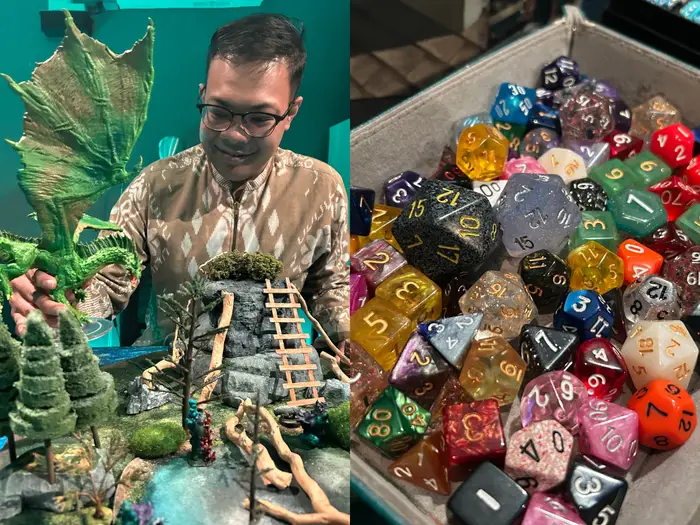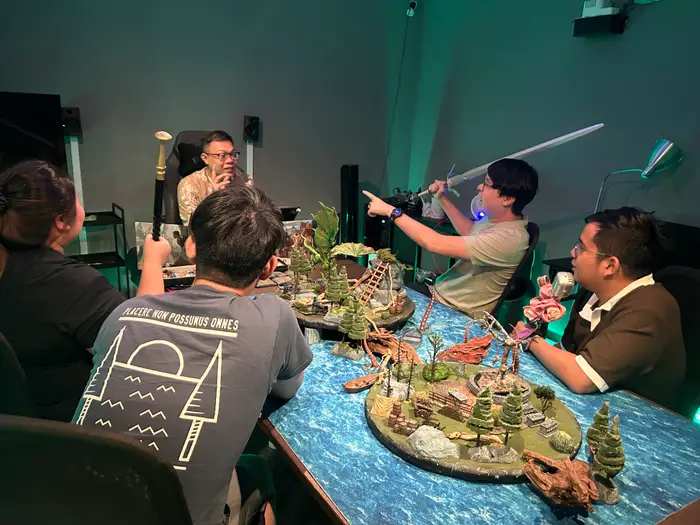I set up a business where I got paid to play Dungeons & Dragons. We now run 180 games a month at our main studio, and I’m living the nerdworld dream.

Farez Najid is a professional Dungeons & Dragons dungeon master who first entered the business after being inspired by Critical Role.
At the height of the COVID-19 pandemic, my friends and I came together to take a leap of faith.
I was working in the Singaporean theater business at the time, so when live performances ground to a standstill, I tried to figure out what to do.
Then the idea hit me: I’d been watching a Twitch-based show called Critical Role for years, where a group of voice actors sit around the table playing Dungeons & Dragons live. It was enthralling to watch the show’s eight cofounders as they found a way to convert their home game into a streaming hit and a business in its own right.
These people are my heroes. And the idea that someone could convert their nerdy hobby into a career inspired me.
I wondered — what if I could make a career out of D&D too?

I have everything I need in my studio, including sprawling battle maps, ferocious dragon miniatures, and an extensive dice collection.
My business partners, Jodie Yeo and Dennet Krishnan, took a chance on the wild idea that we could set up a small studio and run paid Dungeons & Dragons games.
Here’s how that works. Some D&D fans may be looking for other folks to play the game with and a comfortable space to play it in at an affordable rate. Others are looking for experienced dungeon masters — the people responsible for crafting the game narrative. Games can be one-shots spanning three to four hours or multi-game campaigns, not unlike those you see on Critical Role and Dimension 20.
When we started out in April 2021, we had 500 Singapore dollars, or about $370, in capital and operated out of a single-room studio. We ran five games weekly, charging people $30 per person. That meant that a table of five could net me around $150.
It helped that I’d started running paid games online at $25 per head while we were in the pandemic lockdown. We began to get more bookings, and the single-room studio space wasn’t enough.
After a few months, we opened a second and third game room. We then realized we were getting way too many bookings to keep it limited to three rooms.
We moved to our current location at Arumugam Road in April 2023. It has four separate gaming spaces, including a staging area complete with a projector and equipment — where people can play their games live for an audience, Critical Role-style.
It’s important to me that players are immersed in the game and feel safe and included at my table. That means pulling out all the stops, with custom terrain for games. It means being educated about gaming best practices and being as good a listener as you are a storyteller. It also means a full day of prep and setup before a game.

Setting up and preparing for a game can take an entire day, but I find it rewarding.
I make sure I have all my non-player characters prepped, and I review my notes again to ensure my storytelling is solid. I also take time to set up things like battle maps in the center of the table — we have equipment from terrain tiles and monstrous miniatures that I get to play with.
Setting up a proper studio space, too, has improved the player experience. We have rooms that we try to soundproof as much as possible so the noise from one game doesn’t filter into another.
There’s also a community space outside our main studio, where people can hang out before and after their D&D games. And there’s a retail space where people can pick up merchandise like dice and miniatures.
Right now, I still run games — but I’ve limited it to a yearlong campaign for a small group of players.
Now, I’m more focused on the business development aspect of TableMinis — because the business is now bigger than me. With our Chinatown outlet that opened in September, we now have two separate studio locations that can run multiple games per night.
We’ve also started training new game masters under the store’s dungeon-master training program. The idea is that after three to six months of training, people can start making money running D&D games for their clients, too.
Under that program, dungeon masters can earn between $50 and $80 for the games they run, depending on their experience level. We now have 41 game masters under that program, and collectively, we run more than 180 games a month at our Arumugam Road studio and other pop-up spaces.
Some people may say it’s a bad idea to turn your hobby into your career — because then, the thing you love most becomes work. But, to be honest, this is a dream job.
I now get to create, tell stories for a living, and guide others along the path to doing that themselves. And there’s nothing better than that.






